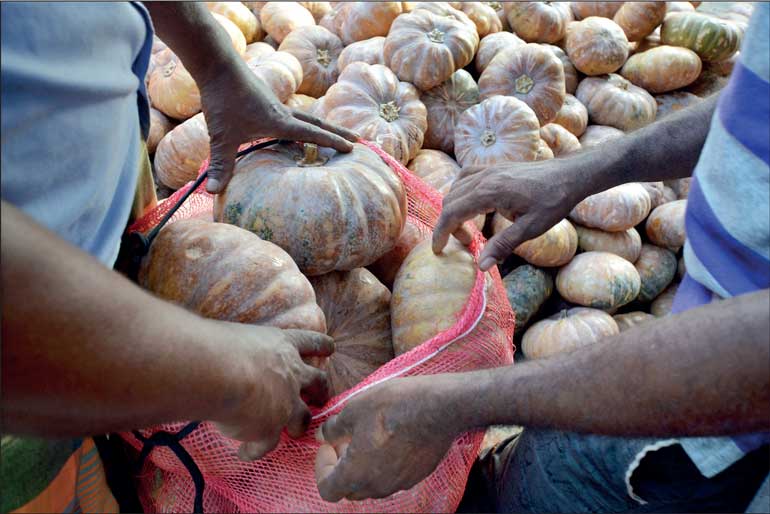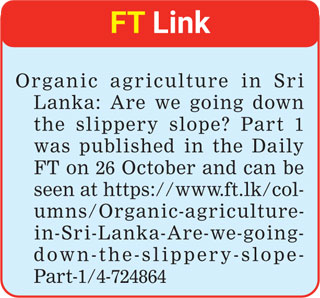Thursday Feb 19, 2026
Thursday Feb 19, 2026
Wednesday, 27 October 2021 00:00 - - {{hitsCtrl.values.hits}}

Food security implies food production, availability and access. The approach to organic agriculture by the Sri Lankan Government in 2021 has compromised food production and long-term food security of the nation – Pic by Shehan Gunasekara
|
 (e) Organic agriculture can threaten food security in Sri Lanka
(e) Organic agriculture can threaten food security in Sri Lanka
Food security implies food production, availability and access. The approach to organic agriculture by the Sri Lankan Government in 2021 has compromised food production and long-term food security of the nation. Nearly 88% of the organic farmers, are in developing countries; India (0.6 million), Ethiopia (0.2 million), and Mexico (0.2 million) producing traditional export crops, such as coffee and tea. Organic agriculture cannot overcome flood or drought risk and food shortages. Sri Lanka’s subsistence farmers are more vulnerable to these risks which affects food availability.
More land would be required to produce the same quantity of output with organic methods and hence organic agriculture cannot guarantee food security. Most smallholder farmers in Sri Lanka are poor and spend over 70% of their income on food. Any increase in the price of food is associated with higher levels of food insecurity and malnutrition and spread of poverty. Organic smallholders sell their harvest in conventional markets to local traders at lower prices in return for immediate cash. Increasing yields requires large quantities of organic material (e.g., manure) not available at the farm itself and the cost can be substantial. Switching to organic is not always beneficial for smallholders and should therefore not be considered a general strategy for poverty reduction. If larger number of farmers switch to organic practices in Sri Lanka let us sat for rice, total output will fall, prices will increase, making food less affordable for poor consumers threatening food security.
Organic farming today only accounts for 1% of the agricultural land, a full conversion to organic agricultures as envisaged by the government of Sri Lanka is totally unrealistic. Organic farming cannot spread automatically in developing countries simply using subsidies. Successful early innovations are needed to enhance adoption of OA. More rigorous empirical studies are needed to show that organic farming can be profitable. But with existing support through subsidies, it is less clear whether organic farming could also be profitable without subsidies in the long term.
Sustainable food security needs a combination of organic, conventional, and possibly ‘hybrid’ systems to produce more food at affordable prices, and reduce the environmental costs of agriculture. Food waste has increased and this is an incredibly complex. If we retain the yield and land-use improvements of conventional agriculture and reduce food waste, we can spare more land for nature.
(f) Subsidies, markets and pricing in organic farming
The Government, through sheer ignorance, still uses these failed agricultural policies to continue to subsidise and even to give free compost for farmers. This policy to encourage organic farming is totally incorrect because it will lead to inefficient production. Government subsidies for organic farming can add to policy risk because risk-reducing inputs are not allowed.
The use of compensation to reward organic farmers for lost yields is irrational. When we lose production due to organic farming, the prices of food (say rice) will increase. Once we compensate these farmers with money, the purchasing power will increase and this will lead to further increase in prices. Inflation will nudge through the roof. Why cannot these Brahmins understand this simple truth? This will affect food security in the country. For traded commodities such as tea, price competition is essential.
Certification of organic products require crops to be grown on organically farmed land at least for three years before they can be labelled organic and this is a cost to farmers. Certification of organic tea is very expensive (see Rajadurai). And this may affect export markets for Sri Lanka. Tea plantation needs an additional 100 to 150 men per hectare to tend to the fields. Hence, the use of organic fertilisers, natural pesticides and other permitted substances is uneconomical in the long-term.
Currently we are being entertained by a very interesting spectacle where plane loads of compost are being imported from India. We also saw nano-nitrogen being imported and plane loads were unloaded with several minsters present. But this is done for political visibility and no one cares. But I would urge the Ministers to give all the data on the cost of these imported compost and nano nitrogen. We would like to get an idea on the price of a kilogram of rice with those imports. I hope that the data will not be deleted.
The market must be understood and allowed to work for agricultural commodities including organic products. Consumers search for new quality organic products and the price may be generally high due to lower yields. Sri Lanka’s ‘organic’ tea prices may have to rise 75% to compensate the increase in production costs and reduced yields. Recovery may take at least three years to achieve (see Rajadurai).The challenge is how to increase yields and reduce prices for a rapidly increasing population. Farmers may opt for organic agriculture, if there is a strong demand for organic products and premium prices.
 (g) Ignoring niche markets and other entrepreneurial opportunities
(g) Ignoring niche markets and other entrepreneurial opportunities
If properly understood and planned, Sri Lanka could have promoted viable organic opportunities for farmers in niche markets. The gluten-free quinoa in Peru, saraceno grain in Italy, re-introduction of local rice varieties in traditional diets and cultures in Indonesia and promotion of old varieties of rice in Sri Lanka are examples. Agri-tourism or (around farm) and ecotourism for city dwellers, who appreciate healthy rural landscape, creates new income opportunities for organic farmers.
In Sri Lanka, some private tea producers with long term experience have created small organic zones for tea, which they utilise to supply limited demand in niche international markets.
Why not focus on this without producing organic tea in the whole country? The world demand for organic tea is only 1%. According the Rajadurai, “Organic is a certification,” “This is a very niche market with many restrictions and specifications are required to get certification. At a commercial scale it is not viable.” Another example of a niche market is farmers producing Maya chocolates for tourists in Mexico. Sikkim's tourism sector, benefited greatly from the new organic image: between 2014 and 2017, the number of tourists increased by over 50%.
Organic farming by itself cannot provide sustainable agriculture and food security, but innovative combinations of organic and conventional methods can contribute toward sustainable productivity increases in agriculture. The highly polarised ideological debates between advocates of organic agriculture and advocates of conventional agriculture are totally unproductive. According to Prof. Foley, combining organic and conventional practices can create truly sustainable food systems.
(h) Climate change
Climate scientists agree that our climate is changing and increasingly uncertain extreme weather events can occur. Approximately 25% of the anthropogenic greenhouse gas (GHG) emissions are attributable to food production. Evidence suggests that organic agriculture uses less energy per unit of land. But organic farming has lower impacts when expressed per unit of land but not when expressed per unit of output. Overall, the evidence does not support the notion that organic agriculture is more climate friendly than conventional agriculture (WBA 2016).
Future of organic and conventional agriculture in Sri Lanka
Ideally, for success in organic agriculture, new varieties are required that are adapted to organic farming systems. In the short run, organic crops must be introduced within selected market segments. But conventional agricultural research is moving away from high inputs of nutrients and chemical pesticides. They now focus on developing crops that can grow in a drought; that can survive in a flood; that can resist pests and disease and higher yields on the same land with less fertilisers. Future research will focus on growing plants that can create their own nutrients to reduce the use of fertilisers and minimises pesticides. The aim is to shift the yield frontier and increase resistance to stress. The yield gaps may increase with increasing conventional yields because there are slower plant genetic improvements in organic farming.
This second GR will improve yields of crops grown in infertile soils by farmers with little access to fertiliser. These crops will tolerate low soil fertility and enhance acquisition of immobile nutrients such as phosphorus and potassium more efficiently. Substantial yield gains in low-fertility soils (e.g. phosphorus efficiency in bean and soybean) improve the productivity of low-input agro ecosystems, and reduce the environmental impacts of intensive fertilisation. These new varieties will almost achieve the objectives of organic farming. Organic agriculture should only be a supplement to these new challenges because organic agriculture cannot feed the world
Sri Lanka must not repeat the mistakes of the past. The country should have a broader vision to achieve multiple goals namely food security, environmental protection, poverty alleviation, elimination of hunger and nutritional deficits and not just organic farming. These issues are interconnected. Harnessing the best of scientific knowledge in the country is crucial for these challenges. It requires cooperation, innovation and communication across the scientific community. Scientists from multiple disciplines must be involved in trans-disciplinary studies, and all scientists must broaden their focus.
Organic farming should be part of overall farming in Sri Lanka with conventional farming still at the forefront. The synergies that exist between organic farming and conventional farming systems must be integrated to get a hybrid system. In many situations, crop productivity and environmental efficiency of organic farming could be further improved by combining with moderate levels of synthetic fertilisers. The ban on chemical fertilisers must be withdrawn. At the time of writing I heard that the Government decided to import 100,000 tons of ammonium sulphate for tea (has it reversed the ban?).
In the short term, it is very important for the President to remove the Minister for Agriculture and replace him with an educated person (at least B.Sc agriculture or biological sciences, other qualifications from an international university and an extremely good command of the English language so that he can communicate with local and international professionals). An insurance agent cannot guarantee food security for Sri Lanka.
Enlightened leadership by President Gotabaya Rajapaksa can still provide much-needed support to the agricultural sector to increase food production and fight poverty, inequality, and environmental degradation. However, if he is weak, the massive waves of distrust and fear among farmers will remain a dangerous flash point. Gotabaya must use all the knowledge, experience and above all listen to scientists and professionals to carefully balance the conflicting dimensions. We are on the brink of disaster and Sri Lanka will be down the slippery slope sooner than later.
